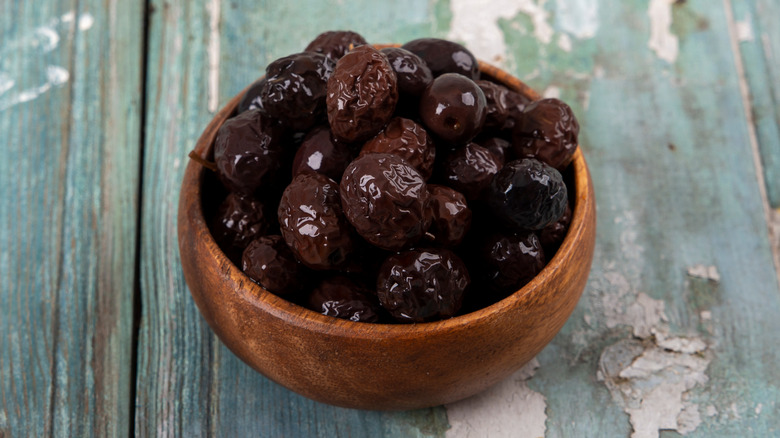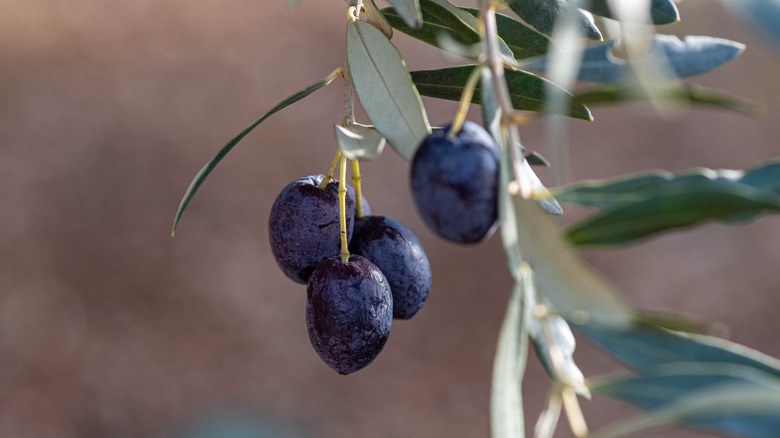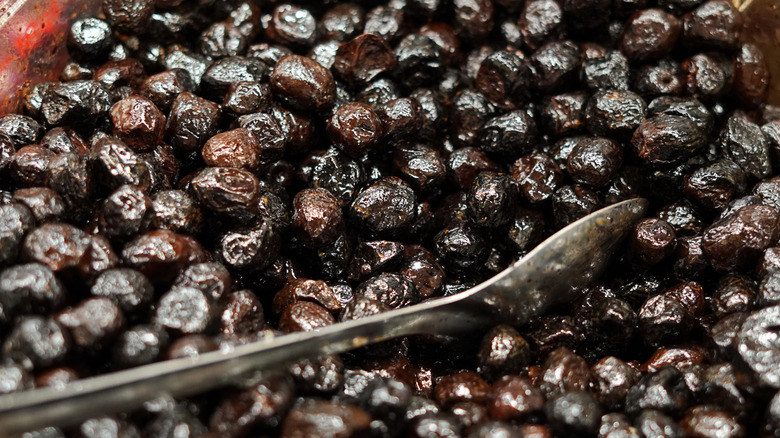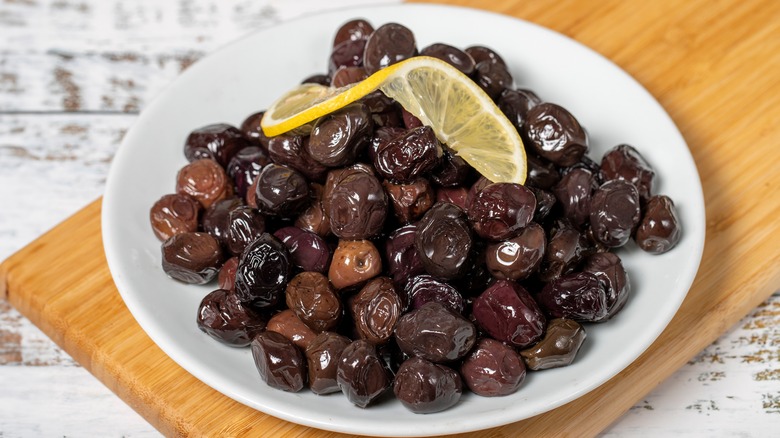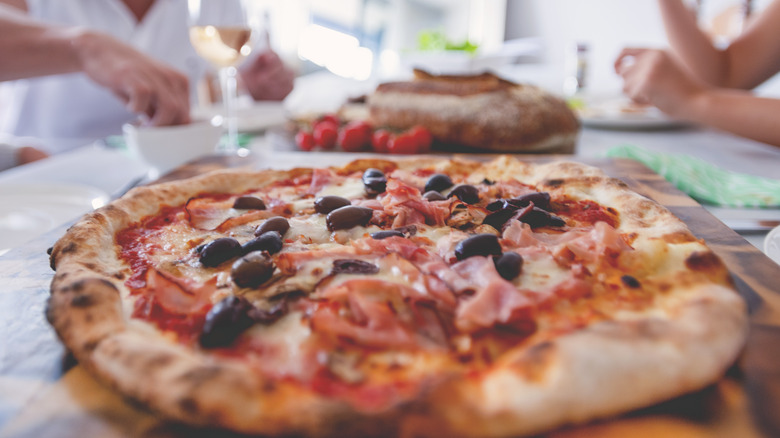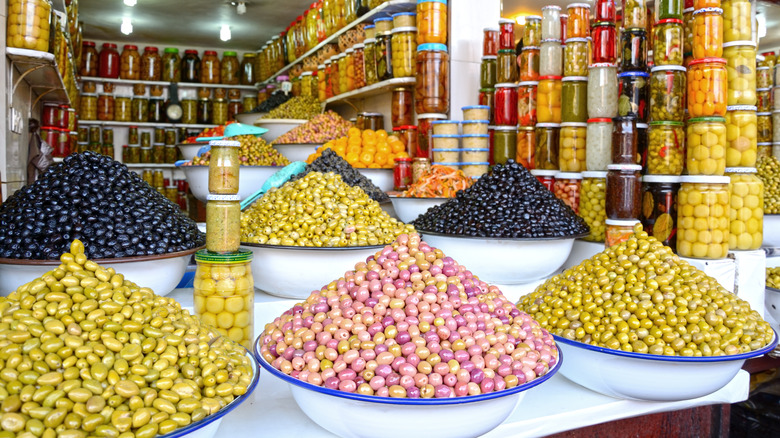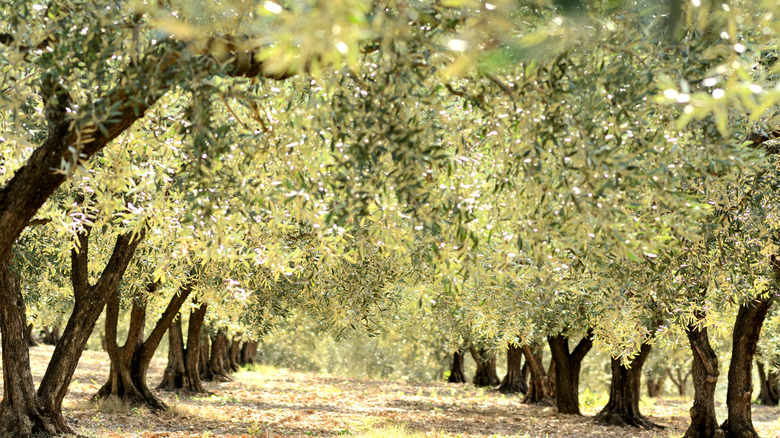Looking For Olives That Pack A Punch? Try The Nyons Variety
In the scramble for cool food ideas, party planners everywhere have to track which meats, nuts, and crackers are on trend at any given time so they can build the perfect charcuterie board. One item that you might have on your shopping list as a matter of routine is the tried-and-true Kalamata olive. They may be delicious, but they're not the only olives that deserve your love. Maybe this is the time to make a French pivot and try the exceptional Provence staple that is Nyons olives.
Your next party is a great time to roll out an appetizer ramekin of these wrinkly, dark brown, unusually flavored olives from the hilly Drôme region of France. Nyons olives will treat your friends to an earthy, full-bodied flavor — not to mention a good conversation prompt, as these little gems come with a story. Their dramatic tale includes a merciless frost that nearly wiped them out, farmers who rallied to save them, and a subsequent government stamp of high-quality approval — the first Tanche olives to acquire such a certificate of prestige. Sometimes called the Rolls Royce of French black olives, Nyons olives deserve a chance to shine somewhere on your next party menu.
What are Nyons olives?
Nyons olives (scientific name: Olea europaea) may look a bit rougher than some other varieties, but that's part of their charm. They have large pits and wrinkly skin, the latter because they're ripe and harvest-ready in the winter months, which leaves their skin a bit shriveled from the dry, cold air. They're part of the Tanche family, which consists of olives grown in and around an enchanting town in southeastern France called Nyons.
They have a strong flavor that's distinctive to the soil and climate where they're grown, a location with a rich history that has made Nyons olives the comeback kid over the last few decades. In the mid-1990s, a shattering frost wiped out huge swaths of olive trees in southern France. This disaster was met head-on by determined farmers, who rallied together to replace the groves. Eventually, these farmers secured an Appellation d'Origine Contrôlée, an impressive French certification that vouches for the quality and origin of the olives. As a result, Nyons olives, always delicious, have become highly prestigious as a protected olive tree, and they're now synonymous with rigorous standards of consistency and excellent quality.
How are Nyons olives made?
Nyons olives are meant to be picked at their most complete, wrinkled ripeness. When vineyards leave the olives to fully mature, some of their inherent bitterness ages off, leaving them markedly more pleasing to the discerning palate. Those bitter flavor notes are even further washed away when they're dropped into a 10% salt water solution to brine for at least six months. Any remaining bitterness in the olives leaks out from the olive flesh and straight into the salt water.
Another way Nyons olives are readied for sale is by dry-curing the small fruits directly into salt. This salt penetrates the olive flesh and extracts its bitterness. Dry-cured Nyons olives are then packed in olive oil. During either curing process, the olives' dark coloring is pulled out of their flesh, dulling the black fruit to more of a dark, russet brown. This process earned them the nickname "monks habit."
What do Nyons olives taste like?
Nyons olives are uniquely delicious, though describing their flavor can be tricky. Some characterize Nyons olive flesh as having a particularly creamy texture that showcases hazelnut and almond flavors, which rise after a dry cure in salt. Trying these olives fresh off the tree, however, will likely be unpleasant since they have been weathering tough temperatures and a sunny but very dry climate. This leaves them particularly bitter prior to any curing treatment.
Even after a saltwater brine or dry-cure, however, these olives may still deliver a bitter, if pleasing taste. In contrast, some have described the olives as both meaty and sweet and have even suggested they lack bitterness. Add to that additional flavor notes that include an earthy undergrowth, hints of sweet fruit, and an aroma of chocolate. Where everyone agrees is that the flavor is complex and utterly delicious, either straight from the jar or in any tapenade.
How to Cook With Nyons
Charcuterie boards and ramekins aren't the only way to utilize Nyons olives, despite the popularity of these uses. The olives' bold flavor and unique bitter-and-sweet juxtaposition make them a perfect ingredient for robust pasta sauces, pizza toppings, and more. Keep in mind when cooking with these olives that they pack a flavorful punch, and this can easily overpower a dish if you're not cautious. Use them moderately, or make a point to blend their strong flavor with garlic, herbs, or citrus for balance in your meal.
One thing is certain: You'll want to fully wash off these olives' salty brine before using them in your recipe, especially if you're using Nyons olives as a fabulous addition to salads. Their fleshy texture also makes them an easy win in most Mediterranean dishes or an intense flavor addition to any ratatouille recipe. Don't forget that tapenade recipe you may have plucked from a recent reel, post, or tutorial — Nyons olives are a strong choice for a particularly powerful olive-based spread.
Where to Buy Nyons
Nyons olives can be purchased fresh or jarred. The fresh variety is dry-cured and ready for sale within a few weeks of harvest. Jarred Nyons olives have a longer shelf life and are available from artisan food suppliers, some of which can even ship these small fruits straight to your door. Your local specialty food stores — or even some big-name retailers — are also great places to look for Nyons olives. One place you might not think to look, however, is in some specialty gift baskets, such as My Panier. As with any olive, buy them with the pits intact to save yourself the softening effects a jarred brine can have on the inside of a pitted olive.
A connoisseur could even visit Nyons itself, specifically to taste Nyons olives that have been pressed into olive oil. Every year at the Institut du Monde de l'Olivier, a panel performs an official, organized tasting of the oil pressed from Nyons olives. After holding the small, opaque blue glasses in their palms to warm the oil and sniff its apple and grassy notes, they sip, anticipating a deliciously buttery, nutty flavor.
Nutritional information about Nyons olives
Like any olive, the Nyons variety has meaningful health benefits. Olives are a low-calorie Mediterranean fruit packed with vitamin E. They also contain fiber — 1.6 grams in one olive — which many Americans are missing in their diets, and they help maintain good digestion. Additionally, they contain phytonutrients that include antioxidants; these give your body an anti-inflammatory boost and help protect your cells from damage. Olives do have fats, but they're largely unsaturated and monounsaturated — the kinds that diminish your body's "bad" LDL cholesterol and boost its HDL, or "good" cholesterol.
Nyons olives, like any other kind, do contain salt thanks to the various ways olives are cured and jarred in brines. Consider washing your olives if you're concerned about your salt intake. All of that good news, however, doesn't mean you should necessarily go overboard munching on olives. Limiting yourself to about a quarter cup (approximately a handful) will keep your tangy, salty olive snack from packing excessive calories into your diet.
